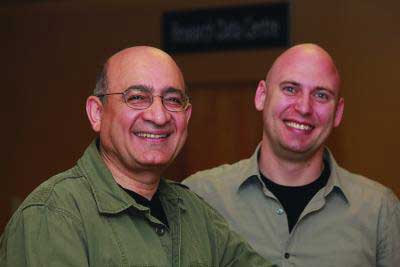It's a tiny, plain research space, with four small workstations and no Internet access. It requires, among other things, an RCMP security clearance to access the information located within it, and has steel reinforcement built into the walls – so forget about cell phone use. Card key access is tightly controlled and someone is on-site to monitor attendance and carefully screen all notes and results that leave.
So, with all this fuss to access, why is Abdie Kazemipur (sociology) so happy? He and other approved researchers now have access to the entire Statistics Canada (StatsCan) database system – a new initiative that will help University of Lethbridge researchers gain significant ground as they work on projects that require raw data sets normally not available to the general public.

The U of L recently flipped the 'on' switch to launch a StatsCan Research Data Centre (RDC) Branch, one of just two dozen all-access points in Canada – mostly in larger institutions – for people who are working with data provided by StatsCan for approved projects.
U of L administration (VP-Academic, VP-Administration, and VP-Research) and the dean of Arts and Science supported the $70,000 project. It also received significant input and assistance from the library, campus facilities and IT departments as the space was created.
Kazemipur, the academic director of the U of L Research Data Centre and a sociology researcher who uses StatsCan data in his work on immigration, says the chance to access rich individual and household data in Lethbridge saves both time and money, offering an opportunity to significantly increase research productivity.
"I would previously have to go to Calgary, and spend intense days analyzing the data," he says. "There were many limitations on my time, and on what I was able to do during the time I had."
Kazemipur says the new centre should expand research opportunities for many faculty members in social sciences, health sciences and management who, like him, want to go deeper into their research and beyond the data available for public use.
Local access should also be an enticement to other researchers to come to the U of L to work or conduct research, in particular the 22 research affiliates of the Prentice Institute for Global Population and Economy, which is expected to be one of the more frequent users of the facility.
"Researchers in the Prentice Institute – more than 20 faculty, post-docs and students – are delighted to have access to micro-level data in our new Research Data Centre," says
Dr. Susan McDaniel, the institute's director. "Our mission is to examine population change in shifting economic environments. One of the best ways to do this is to follow individuals over time rather than compare different sets of people at two points in time."
McDaniel says that the RDC enables researchers in one of her SSHRC-funded projects to follow Canadians at seven points of time as they move from mid-life into their older years.
"It is really, as famous hockey player Wayne Gretzky was fond of saying, skating to where the puck will be. I am certain that having the RDC here will help us recruit new faculty and junior research chairs to work in the Prentice Institute."
The process to gain access to the data is not as challenging is it might first sound, Kazemipur says. Projects must go through several steps, including an
online application to the Social Sciences and Humanities Research Council (SSHRC), which triggers a request to StatsCan for access to the appropriate dataset – and that's where the security checks come in.
Once approved, a researcher gains access to the data centre with a swipe card, and can sign in and out as needed to complete their work.
Anyone wishing to use the centre, or who has a project they feel could benefit from access to the StatsCan data, can contact Kazemipur for more information on the process.
Contact him at 403-329-5132 or e-mail abdie.kazemipur@uleth.ca. Or, you can contact site supervisor Martin Russenberger, a part-time StatsCan employee and current Geography/Economics graduate student at the U of L (rdc@uleth.ca).
This story first appeared in the Legend. To view the Legend in a flipbook format, follow this link.
